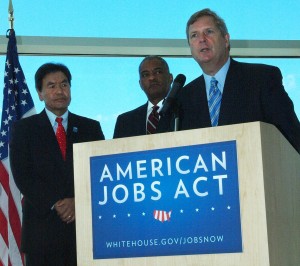
Unanimously, SEC decided to approve JOBS Act Title III, finally enabling small startups to issue equity for non-accredited investors and spread the word about it. The new regulations will be in effect after January 29th 2016.
Here are some requirements approved in the new regulation:
- Businesses can raise up to $1 million per year;
- Non-accredited investors can invest up to 5% of their annual income, but no more than $2,000 per year;
- Accredited investors can invest up to 10% of their annual income;
- All offers must be made by an intermediary: a portal or a broker-dealer;
Companies have to disclose information about the business as well, in order to provide transparency:
- officers, directors and stakeholders with 20% or more of company ownership;
- description about the company and how the money will be used;
- price of the securities, target goal, deadline and additional investments that the company will take in new or earlier rounds of fund-raising;
- partnerships and transactions related to the company;
- current financial condition, accompanied by financial statements: a copy of tax returns or a financial statement reviewed by an independent auditor or accountant, depending on the amount raised.
Portals have to adhere to certain rules as well:
- portals cannot issue financial or investment advice or recommend projects;
- cannot solicit offers to buy or sell securities related to the offers on their websites. In addition, portals cannot handle, process or hold investor securities;
- prohibit some restrictions on compensating for solicitations;
- must provide educational material;
- adopt fraud protection measures;
- provide means for discussion about the projects in the portal platform.
The regulations are fairly straightforward. Tax returns as financial statements will certainly reduce the burden on small companies and will be much cheaper than audited statements.
Businesses must be careful about the amount invested by both accredited and non-accredited investors. Checking their status and getting statements that they are under the caps provided by the regulations is necessary and not expensive.
Image: USDA
Source: ICNW
Related Post
Entradas recientes
- BCP Global Lanza Portafolios de iBonds Utilizando los iShares iBonds™ de BlackRock 9 abril, 2024
- La Iglesia Shincheonji celebra 40 años de historia sin detenerse 21 marzo, 2024
- La Resolución de Conflictos Internacionales y la Institucionalización de la Paz Discutidas en la 8va Conmemoración Anual de la Declaración de Paz y Cese de la Guerra de HWPL 20 marzo, 2024
- 2RMD ofrece uno de los mejores doctores de trasplante capilar en Colombia 11 marzo, 2024
- Corea del Sur concede a Lleida.net su sexta patente en el país 4 marzo, 2024

